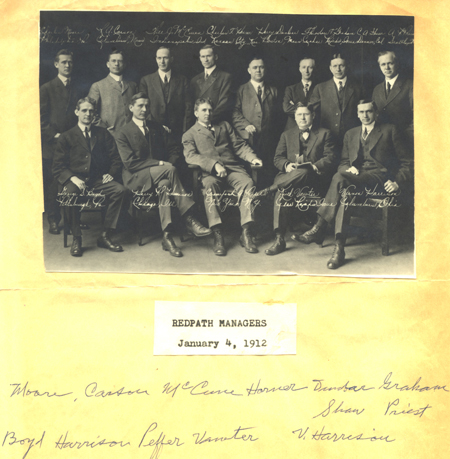The University of Iowa Libraries
Special Collections and University Archives
Finding Aid
|
Papers of Charles F. Horner Access and Restrictions: This collection is open for research. Digital Surrogates: Except where indicated, this document describes but does not reproduce the actual text, images and objects which make up this collection. Materials are available only in the Special Collections Department. Copyright: Please read The University of Iowa Libraries' statement on Property Rights, Copyright Law, and Permissions to Use Unpublished Materials. Use of Collections: The University of Iowa Libraries supports access to the materials, published and unpublished, in its collections. Nonetheless, access to some items may be restricted by their fragile condition or by contractual agreement with donors, and it may not be possible at all times to provide appropriate machinery for reading, viewing or accessing non-paper-based materials. Please read our Use of Manuscripts Statement. Acquisition and Processing Information: In 1971 Bryan Horner, son of Charles F. Horner, sent a box containing correspondence from the early years of circuit Chautauqua to the University of Iowa Library. According to Bryan Horner, many of the old files of the Redpath-Kansas City office were destroyed when the main building of the old Kansas City Horner Conservatory was razed. Photographs: Box 1 |
|
Scope and Contents
The manuscripts of Charles F. Horner contain twenty folders of correspondence, two folders of his writings, and one folder with
clippings and two notebooks listing artists' salaries, their acts, and descriptions of lectures. The correspondence deals
mainly with Chautauqua business material, including many letters to Keith Vawter.
Biographical Note
Charles F. Horner was born in Menomonie, Wisconsin, in 1878 and died in Kansas City in the early part of February 1967 at the age of 88. He is most famous for establishing the Redpath-Horner Chautauqua and Lyceum Bureau in 1906, which provided both educational and entertaining programs for hundreds of towns in the Midwest during the first third of the twentieth century. His programs featured many prominent speakers, such as William Jennings Bryan, Champ Clark, William Howard Taft, etc. A list of distinguished accomplishments include: founder of the Horner Institue of Fine Arts (1914), the Horner Junior college (1927), head of the speakers' bureau in both of Woodrow Wilson's campaigns, accepting an invitation from President Franklin D. Roosevelt to be executive assistant to the administrator of the National Recovery administration (1933), president of the National Aeronautics association, chairman of the Willkie clubs (1940), and chairman of the Herbert Hoover committee on food for small democracies (1940-41). He authored four books: Strike the Tents, the Story of the Chautauqua; The Life of James Redpath; The Road that Leads from Home and Other Poems; and a novel entitled, The Vanishing Prairie.
S Jardine 2/2007
Related Materials
Horner, Charles F. "Strike the Tents, the Story of the Chautauqua," University of Iowa call number: x Collection LC6301C5H6
McCown, Robert A. "Records of the Redpath Chautauqua." from Books at Iowa. 19 (November 1973) Copyright: The University of Iowa.
Records of the Redpath Lyceum Bureau, MsC 150 Please note the list of additional mini-collections of Chautauqua material at the end of the Redpath finding aid.
Box Contents List
Box 1
Clippings
Correspondence
A
B
C
D
E
F
G
H
Horner, Charles F.
I -- K
L
M
N -- Q
R
Redpath Lyceum Bureau #1. Keith Vawter, September 1906-December 1906.
Redpath Lyceum Bureau #2. Keith Vawter, January-April 1907.
Redpath Lyceum Bureau #3. Keith Vawter, May-December 1907. (Misc. No date.)
S
T
U -- Z
Manuscripts
Speeches
"Achievement." The Nineteen Twenty-One Commencement of the Horner Institute of Fine Arts. June 14, 1921. Kansas City, Missouri.
"Address Delivered at the Tenth Anniversary of the Swarthmore Chautauqua Association." January 7, 1921. Philadelphia, Pennsylvania.
Writings
"People Are Pretty Good"
Talent Information:
Kansas. Includes monetary amounts that performers received and details regarding their acts, talents, and scheduled dates for performance.
1923 -- 1924
1924 -- 1925
Music Programs
Performance Schedules
Photos

